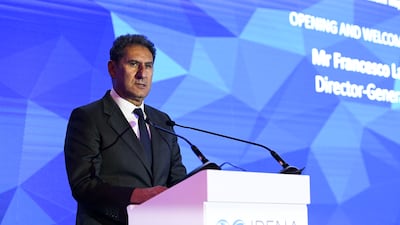Major elections around the world, including in the US, this year could slow the pace of the global energy transition as political considerations take the front seat, the director general of International Renewable Energy Agency (Irena) has said.
Though Francesco La Camera hopes elections in major economies will not influence renewable energy adoption, the fact remains that “governments could feel less free to act”.
More than 50 countries are going to the polls in the next 11 months for presidential and legislative elections.
Most notably, elections will be held in India, the world’s most populous country and the fifth largest economy, and the US, the world's biggest economy.
However, despite potential short-term bumps, the long-term trajectory of renewable energy would not be affected, according to Mr La Camera.
“Nothing can change the direction of travel … because we have come too far. We are at a point of no return,” he told The National.
The rate of expansion of global renewable energy capacity surged by 50 per cent in 2023, with solar accounting for three quarters of the growth, the International Energy Agency has said.
Election trends
In the US, former president Donald Trump is likely to win the Republican nomination for the White House after consecutive victories in the Iowa caucus and New Hampshire primary, with the election set to take place in November.
Mr Trump has promised to prioritise boosting US oil and gas production if elected.
At a public appearance last month, Mr Trump said he wanted to be “a dictator for one day” to address oil production and close the country's southern border.
"A change of administration would mean a radical shift in energy policy for the US," Ed Crooks, Wood Mackenzie's vice chairman for the Americas, wrote in a research note this month.
"Setting aside for now the question of the consequences for low-carbon sectors ... a second Trump administration would also have significant implications for the oil and gas industry."
In India, Prime Minister Narendra Modi is running for re-election to another five-year term.
He heads the ruling Bharatiya Janata Party, which is the favourite to win in 2024's national polls.
India aims to achieve net-zero emissions by 2070 and meet 50 per cent of its electricity requirements from renewable energy sources by the end of this decade.
But coal, which accounted for nearly 75 per cent of India’s electricity in 2022, is expected to continue playing a significant role in the country’s energy mix as power demand grows.
At the Cop28 climate conference in Dubai last year, countries agreed to triple renewable energy capacity and double energy efficiency by 2030.
The renewable energy target was based on a study conducted by Irena, which concluded that global renewable power capacity would need to exceed 11,000 gigawatts by the end of the decade to achieve the goals of the Paris Agreement.
Major fossil fuel producers also pledged to reduce carbon dioxide and methane emissions.
Under existing policies, global renewable energy capacity is forecast to reach 7,300 gigawatts by 2028, the IEA has said.
This growth trajectory would result in global capacity rising to 2.5 times its current level by 2030, falling short of the goal to triple it.
Accelerating renewable energy adoption would require overcoming certain “structural barriers”, Mr La Camera said.
“We need to overcome barriers [such as] infrastructure, grids, the legal environment, the market design, additional capacity, a skilled labour force … and also linking the idea of development to the idea of building the new energy system,” he said.
However, high interest rates and inflation levels have driven up the costs of renewable energy projects.
Geopolitical tensions in the Red Sea and the broader Middle East are now threatening to impede global trade.
Shipping through the Suez Canal, a vital trade link between Europe and Asia, has plunged by 42 per cent in the past two months, a UN study has said, as Yemen's Houthi rebels continue to attack vessels passing through the Red Sea.
Mr La Camera said the tensions may affect the global economy, but not energy transition efforts.
“At the same time, it is making it clear how we need to build a decentralised energy system that is more resilient to shocks,” he said.
Funding the transition is a chief concern among global energy executives and politicians from emerging economies.
Mr La Camera is hopeful that a clear policy could send the right signal to investors.
Irena’s energy transition accelerator financing platform has received close to $5 billion in terms of commitments, Mr La Camera said.
By 2030, emerging markets and developing economies will require $2.4 trillion every year to address climate change, the Climate Policy Initiative says.
“Emerging economies are taking steps to become developed economies. This means that, in the end, there will be another frontier that can bring more impetus to the energy transition,” Mr La Camera said.










